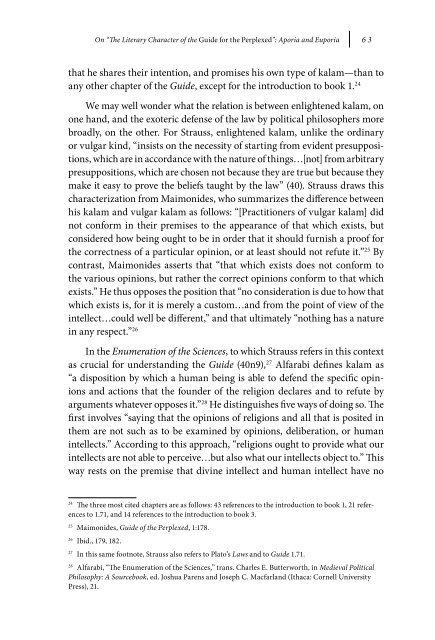Fall 2015
Vol_42_1
Vol_42_1
- No tags were found...
You also want an ePaper? Increase the reach of your titles
YUMPU automatically turns print PDFs into web optimized ePapers that Google loves.
On “The Literary Character of the Guide for the Perplexed”: Aporia and Euporia<br />
6 3<br />
that he shares their intention, and promises his own type of kalam—than to<br />
any other chapter of the Guide, except for the introduction to book 1. 24<br />
We may well wonder what the relation is between enlightened kalam, on<br />
one hand, and the exoteric defense of the law by political philosophers more<br />
broadly, on the other. For Strauss, enlightened kalam, unlike the ordinary<br />
or vulgar kind, “insists on the necessity of starting from evident presuppositions,<br />
which are in accordance with the nature of things…[not] from arbitrary<br />
presuppositions, which are chosen not because they are true but because they<br />
make it easy to prove the beliefs taught by the law” (40). Strauss draws this<br />
characterization from Maimonides, who summarizes the difference between<br />
his kalam and vulgar kalam as follows: “[Practitioners of vulgar kalam] did<br />
not conform in their premises to the appearance of that which exists, but<br />
considered how being ought to be in order that it should furnish a proof for<br />
the correctness of a particular opinion, or at least should not refute it.” 25 By<br />
contrast, Maimonides asserts that “that which exists does not conform to<br />
the various opinions, but rather the correct opinions conform to that which<br />
exists.” He thus opposes the position that “no consideration is due to how that<br />
which exists is, for it is merely a custom…and from the point of view of the<br />
intellect…could well be different,” and that ultimately “nothing has a nature<br />
in any respect.” 26<br />
In the Enumeration of the Sciences, to which Strauss refers in this context<br />
as crucial for understanding the Guide (40n9), 27 Alfarabi defines kalam as<br />
“a disposition by which a human being is able to defend the specific opinions<br />
and actions that the founder of the religion declares and to refute by<br />
arguments whatever opposes it.” 28 He distinguishes five ways of doing so. The<br />
first involves “saying that the opinions of religions and all that is posited in<br />
them are not such as to be examined by opinions, deliberation, or human<br />
intellects.” According to this approach, “religions ought to provide what our<br />
intellects are not able to perceive…but also what our intellects object to.” This<br />
way rests on the premise that divine intellect and human intellect have no<br />
24<br />
The three most cited chapters are as follows: 43 references to the introduction to book 1, 21 references<br />
to 1.71, and 14 references to the introduction to book 3.<br />
25<br />
Maimonides, Guide of the Perplexed, 1:178.<br />
26<br />
Ibid., 179, 182.<br />
27<br />
In this same footnote, Strauss also refers to Plato’s Laws and to Guide 1.71.<br />
28<br />
Alfarabi, “The Enumeration of the Sciences,” trans. Charles E. Butterworth, in Medieval Political<br />
Philosophy: A Sourcebook, ed. Joshua Parens and Joseph C. Macfarland (Ithaca: Cornell University<br />
Press), 21.


